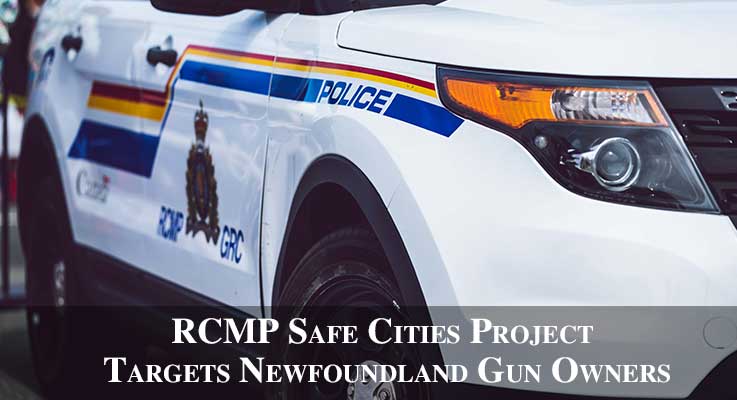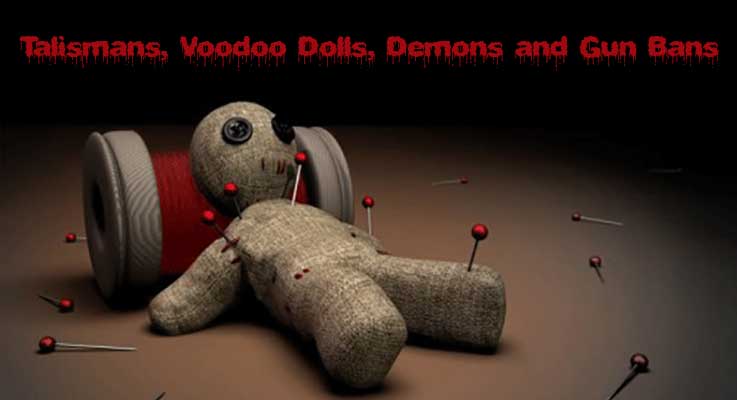The Royal Canadian Mounted Police (RCMP) and the Royal Newfoundland Constabulary (RNC) will target the most law-abiding segment of Canadian society with their “Safe Cities” project, announced August 17, 2017.
Their joint press release starts off with an interesting statement:
“Letters have been sent to owners of unregistered firearms giving them the opportunity to comply with the current legislation.”
How would the police know who own unregistered firearms? What they meant, presumably, is the RCMP sent letters to all gun owners whose Possession and Acquisition License (PAL) expired.
This letter gives firearm owners “the opportunity to comply with the current legislation.”
The second prong of their “Safe Cities” initiative sends armed RCMP and/or RNC members to “the homes of firearms owners whose restricted and/or prohibited gun registrations have lapsed.”
Under the “Safe Cities” project, police will attend the home of every expired PAL license holder and, in addition to ensuring the individual complies with the licensing requirement for firearm ownership, attending police officers will “also pass along information on how to properly store and transport firearms and ammunition.”
When police “pass along information” on these subjects, they will probably inspect the homeowner’s current firearm and ammunition storage systems to ensure those storage systems “comply with the current legislation.”
Thanks to the Firearms Act of 1995, there is little you can do to prevent those searches either.
Both the Firearms Act and the Criminal Code of Canada specifically allow warrantless inspection of a gun owner’s home. A Firearms Officer that wishes to inspect your firearms will demand you arrange a “mutually convenient time” within 48 hours. Your refusal to do so may be considered grounds for a search warrant under the Firearms Act, Section 104 (2).
104 (1) An inspector may not enter a dwelling-house under section 102 except
- (a) on reasonable notice to the owner or occupant, except where a business is being carried on in the dwelling-house; and
- (b) with the consent of the occupant or under a warrant.
(2) A justice who on ex parte application is satisfied by information on oath
- (a) that the conditions for entry described in section 102 exist in relation to a dwelling-house,
- (b) that entry to the dwelling-house is necessary for any purpose relating to the enforcement of this Act or the regulations, and
- (c) that entry to the dwelling-house has been refused or that there are reasonable grounds for believing that entry will be refused
may issue a warrant authorizing the inspector named in it to enter that dwelling-house subject to any conditions that may be specified in the warrant.
Combined with Section 117.02 (1) of the Criminal Code of Canada, Sections 102 and 104 of the Firearms Act ensure police may enter your home “on reasonable notice to the owner or occupant” to “inspect” your firearms, their storage and anything else “necessary for any purpose relating to the enforcement of this Act or the regulations.”
117.02 (1) Where a peace officer believes on reasonable grounds
- (a) that a weapon, an imitation firearm, a prohibited device, any ammunition, any prohibited ammunition or an explosive substance was used in the commission of an offence, or
- (b) that an offence is being committed, or has been committed, under any provision of this Act that involves, or the subject-matter of which is, a firearm, an imitation firearm, a cross-bow, a prohibited weapon, a restricted weapon, a prohibited device, ammunition, prohibited ammunition or an explosive substance,
and evidence of the offence is likely to be found on a person, in a vehicle or in any place or premises other than a dwelling-house, the peace officer may, where the conditions for obtaining a warrant exist but, by reason of exigent circumstances, it would not be practicable to obtain a warrant, search, without warrant, the person, vehicle, place or premises, and seize any thing by means of or in relation to which that peace officer believes on reasonable grounds the offence is being committed or has been committed.
An expired firearms license may give police all the legal justification required to enter your home without a warrant under Section 117.02 (1)(b).
The “offence being committed, or has been committed” is unauthorized possession of a firearm as defined in Sections 91 and 92 of the Criminal Code.
Your only defence to the crime of unauthorized possession of a firearm is a valid Possession and Acquisition License, the very thing you do not have or the RCMP and RNC would not send you a letter and knock on your front door in the first place.
It makes no difference that you did not threaten anyone. It makes no difference that you did not hurt anyone, and it makes no difference that you’re a nice person. It doesn’t even matter if your firearms never left your gun safe. Those firearms remain in your possession and that criminal offence allows police to enter and search your home.
While the press release makes no mention of seizing firearms from unlicensed firearm owners, that too is a very real possibility.
*URGENT: If your Possession and Acquisition License is expired, renew it immediately. Ensure you keep a record of the date and time you sent in your renewal form. If sending your renewal by mail, require a signature for receipt. Ensure you are in full compliance with the Storage, Display, Transportation and Handling of Firearms by Individuals Regulations.
*Take advantage of the protection assured by Firearms Legal Defence insurance. Your CSSA discount code is: CSSA002 and it is very inexpensive. For details, visit https://firearmlegaldefence.com/
*Know who your lawyer is and ensure they attend any inspection of your home.
Sources:
(Full Safe Storage Regulations)
(Safe Storage Basics)


Firearm Confiscation Compensation Program is a Secret